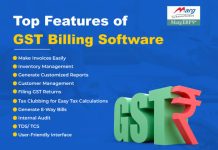Introduction:
Goods and Services Tax (GST) is a tax levied on the supply of goods and services in India. GST has been implemented to simplify the indirect tax system and bring uniformity in the taxation process. Restaurants are one of the businesses that are affected by the GST regime. In this blog, we will discuss the different aspects of GST on restaurants.
GST Rates on Restaurants:
Under the GST regime, restaurants are divided into two categories – AC and Non-AC. The GST rates on these two categories are as follows:
- Non-AC Restaurants: 5%
- AC Restaurants: 18%
Input Tax Credit:
Input Tax Credit (ITC) is a mechanism that allows taxpayers to set off the tax they have paid on inputs against the tax they have to pay on outputs. Restaurants can claim ITC on the taxes they have paid on inputs such as raw materials, rent, and other expenses. However, ITC cannot be claimed on taxes paid on exempt supplies or personal expenses.
Composition Scheme:
The composition scheme is a simple and easy-to-comply scheme for small businesses with an annual turnover of up to Rs. 1.5 crores. Under this scheme, the tax rate is lower, and businesses are required to file quarterly returns. However, restaurants are not eligible for the composition scheme.
GST on Food Delivery Services:
Food delivery services such as Swiggy and Zomato are considered to be an e-commerce operator under the GST regime. They are required to collect and deposit GST on the commission they earn from restaurants. The GST rate for food delivery services is 18%.
GST on Catering Services:
Catering services provided by restaurants are also subject to GST. The GST rate on catering services is 18%. However, if the catering service is provided to a registered charitable organization, the GST rate is 5%.
GST on Alcohol:
Alcohol is not covered under GST, and therefore, the sale of alcohol in restaurants is subject to different taxes, such as Excise Duty and Value Added Tax (VAT).
GST on Service Charges:
Service charges are optional charges levied by restaurants for the services provided to customers. Service charges are not considered as a part of the invoice value and are not subject to GST. However, if the restaurant includes the service charge in the invoice value, it will be subject to GST.
GST on Discounts:
Discounts offered by restaurants to their customers are considered as a part of the invoice value and are subject to GST. For example, if a restaurant offers a 10% discount on the total bill amount, the GST will be levied on the discounted amount.
GST on Takeaway and Home Delivery:
The GST rates for takeaway and home delivery are the same as for AC and non-AC restaurants. However, if the restaurant provides home delivery services through food delivery aggregators such as Swiggy and Zomato, the aggregators are required to collect and deposit the GST on the commission they earn.
GST on Imported Food Items:
If a restaurant imports food items, GST is levied on the value of the imported goods, including the cost of transportation and insurance.
GST on Input Services:
Restaurants often avail various input services such as maintenance, repairs, and cleaning services. GST paid on such input services can be claimed as Input Tax Credit by the restaurant.
GST on Supplies to SEZ:
If a restaurant supplies food items to a Special Economic Zone (SEZ), the supply is considered as zero-rated supply, and no GST is levied on such supply. However, the restaurant must provide necessary documents to support the claim of zero-rated supply.
GST on Food Coupons and Vouchers:
If a restaurant accepts food coupons or vouchers as a mode of payment, GST is levied on the value of the food coupon or voucher. If the food coupon or voucher is issued by an employer as a part of an employee welfare scheme, the supply is exempt from GST.
GST on Franchisee Services:
If a restaurant operates under a franchisee model, the franchisee is required to pay GST on the royalty or fees paid to the franchisor. The GST rate for such services is 18%.
GST on Intra-State and Inter-State Transactions:
If a restaurant supplies goods or services within the same state, it is considered as an intra-state transaction, and the restaurant must charge and pay CGST and SGST. If a restaurant supplies goods or services to a different state, it is considered as an inter-state transaction, and the restaurant must charge and pay IGST.
Conclusion:
In conclusion, restaurants must ensure that they comply with the GST regulations and file their returns on time to avoid penalties and fines. Restaurants should keep themselves updated with the latest GST regulations and seek the help of a tax professional to ensure compliance with the GST regulations. Understanding GST on restaurants is crucial for restaurant owners to ensure that they do not face any legal or financial issues in the future.
GST on restaurants is a complex topic, and it is essential for restaurant owners to have a clear understanding of the various aspects of GST. Restaurants must ensure that they comply with the GST regulations and file their returns on time. Failure to do so may result in penalties and fines. It is advisable for restaurants to seek the help of a tax professional to ensure compliance with the GST regulations.
Read more useful content:
- How to Save Tax on Salary
- Guide to Understanding Direct Taxes in India
- Filing Income Tax Returns
- GST E-invoice
Frequently Asked Questions (FAQ’s)
Q1.) What is the GST rate for restaurants?
The GST rate for restaurants is 5% for restaurants without air conditioning (AC) and 18% for restaurants with AC.
Q2.) Do restaurants have to pay GST on service charges?
No, service charges are not considered as a part of the invoice value and are not subject to GST. However, if the restaurant includes the service charge in the invoice value, it will be subject to GST.
Q3.) Are discounts offered by restaurants subject to GST?
Yes, discounts offered by restaurants to their customers are considered as a part of the invoice value and are subject to GST.
Q4.) Are takeaways and home deliveries subject to GST?
Yes, the GST rates for takeaway and home delivery are the same as for AC and non-AC restaurants.
Q5.) Can restaurants claim Input Tax Credit for GST paid on input services?
Yes, restaurants can claim Input Tax Credit for GST paid on input services such as maintenance, repairs, and cleaning services.
Q6.) Is GST levied on imported food items by restaurants?
Yes, if a restaurant imports food items, GST is levied on the value of the imported goods, including the cost of transportation and insurance.
Q7.) Is GST levied on food coupons or vouchers used at restaurants?
Yes, GST is levied on the value of the food coupon or voucher used at restaurants.
Q8.) What is the GST rate for franchisee services?
The GST rate for franchisee services is 18%.
Q9.) Is GST levied on supplies to Special Economic Zones (SEZs)?
No, if a restaurant supplies food items to an SEZ, the supply is considered as zero-rated supply, and no GST is levied on such supply.
Q10.) Are intra-state and inter-state transactions subject to different GST rates?
Yes, if a restaurant supplies goods or services within the same state, it is considered as an intra-state transaction, and the restaurant must charge and pay CGST and SGST. If a restaurant supplies goods or services to a different state, it is considered as an inter-state transaction, and the restaurant must charge and pay IGST.








